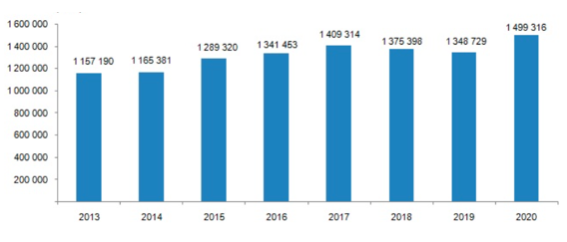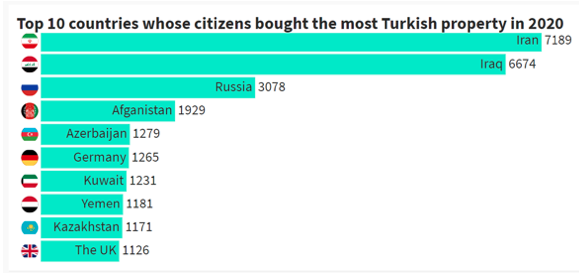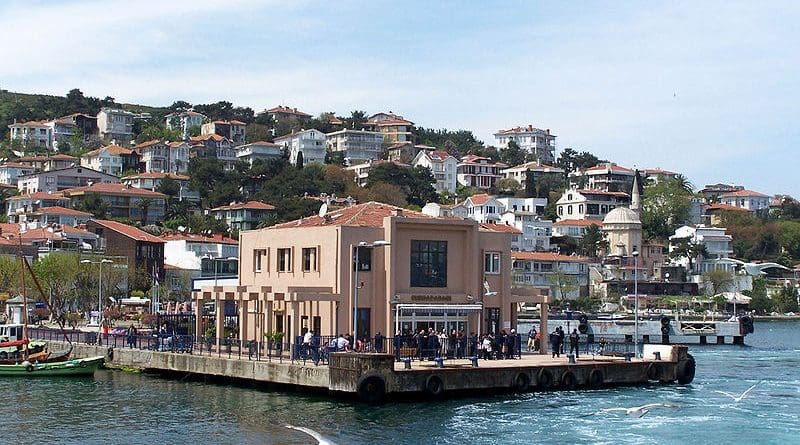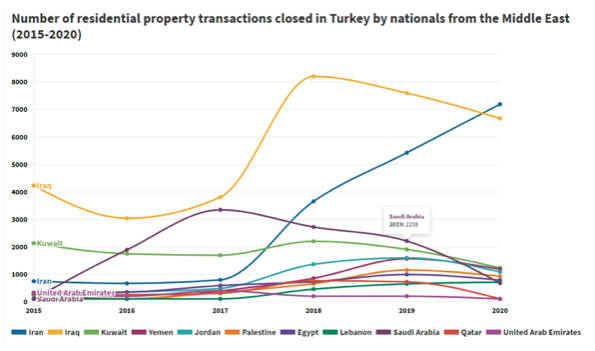Turkish Real Estate Market Saw Surge Of Interest From Iranians, Russians, Kazakhstani And Chinese – OpEd
By Tranio
In 2020, house sales in Turkey increased by 11.2% compared to the previous year, reaching almost 1,5M purchases. However, the pandemic hit the foreigners’ interest in Turkish real estate, cutting off 10% of what they bought in 2019.
Middle East buyers closed more than half of the deals with Turkish real estate made by foreigners, with Iranians leading foreign buyers for the first time since 2015. Analysts from real estate international brokerage Tranio explain what is happening in the Turkish housing market, where the prices are going and what locations are most popular among buyers.

Last year, foreigners bought 41.3 thousand Turkish houses and flats, 10% less than a year earlier, data from the Turkish Statistical Institute (TurkStat) showed. The strongest decline in home sales to foreigners was in the spring when the country closed the border, and it became impossible to come to choose a property and sign a contract. Flights resumed in the summer, and sales returned.
Iranians pulled past Iraqis in property purchases for the first time during the last five years, buying up 17% of all Turkish property purchased by non-Turkish buyers. Turkey is the closest and safest harbour for those Iranians who want to safely invest their funds in a foreign land and to evade sanctions, mostly through the use of bitcoin.
Iraqis, who had the highest number of purchases all the previous years, came second with 6,674 deals. Russians were the third nation purchasing homes in the country, accounting for 7.5% of all sales to foreigners. Afghans, Azerbaijani and Germans follow them.

Iraqis, Afghans and Germans have always been among the biggest foreign nationals holding either a Turkish residence or work permit. The pandemic has seriously affected both the number of immigrants in Turkey and property investment made by them.
One of the opposite examples is Kazakh nationals. Despite the overall decrease, Kazakh buyers bought 50% more Turkish houses than in 2019, jumping to TOP-10 foreign buyers of real estate in Turkey. Kazakhstanis were the first tourists to arrive in Turkey after the quarantine in June 2020, when borders were still closed for many other countries. Another reason for such an increase of interest in Turkish property is the Kazakh expatriate community, with more than 23,000 Kazakh nationals living in the country as of 2020, which has increased by 12% over the last year.
Other foreigners on a buying spree in Turkey in 2020 were Chinese buyers who doubled their purchases since 2019. At the same time, Saudi Arabians who were active in the Turkish real estate market the previous years have reduced their investments by 70%.
In 2018, Turkey slashed the financial and investment criteria for foreigners to become Turkish citizens, boosting investment in the economy and real estate deals in particular. Since then, foreigners can become citizens if they own property worth $250,000 for three years (down from $1 million). The plunge in the Turkish lira’s value that year added to the Turkish real estate market’s attractiveness and led to a 78% increase in the total number of houses sold to foreigners in 2018.
Many foreign buyers invest in Turkish property to earn a passive year-round income, renting it out. For example, a 50-sq.m two-room apartment in a new residential building in Alanya or a 90-sq.m two-room flat in Esenyurt, a new district of Istanbul, could be bought for €50,000. A one-bedroom apartment in Alanya can bring €250-300 each month. If all expenses are taken into account, including rental income tax, annual property tax, and flat maintenance, the yield will be around 4%.
What is happening in the Turkish property market
The most popular locations for foreigners in 2020 were Istanbul, Antalya, Ankara and Bursa.
According to Tranio, Russian speakers’ interest in buying property in a number of Turkish regions more than tripled in 2020 compared to 2019. Fethiye became the growth leader with 217%, Bodrum came second with 200%, while Mahmutlar came third with 150%. Istanbul is fourth with 133% growth, the popular resort destinations of Alanya and Antalya almost doubled.
As for real estate prices, Bodrum is the most expensive location in Turkey, with an average of €1,350 per square meter. Marmaris comes second, with €1000 euros per square meter. Fethiye is the third €800 euros per square meter. Fourth and fifth places share Istanbul and Alanya – €650 per square meter. The cheapest real estate can be found in Ankara for €350 per square meter.
“Over the last year, we have seen a serious increase in interest in Turkish real estate,” — says George Kachmazov, managing partner of the international real estate brokerage Tranio.com. “This is largely due to the low-base effect: several years ago demand fell, but now it is recovering”.
The development of remote working and low prices compared to European real estate are also factors in the growth.
Tranio is an international developer and overseas property broker, with an extensive expertise in real estate markets.


